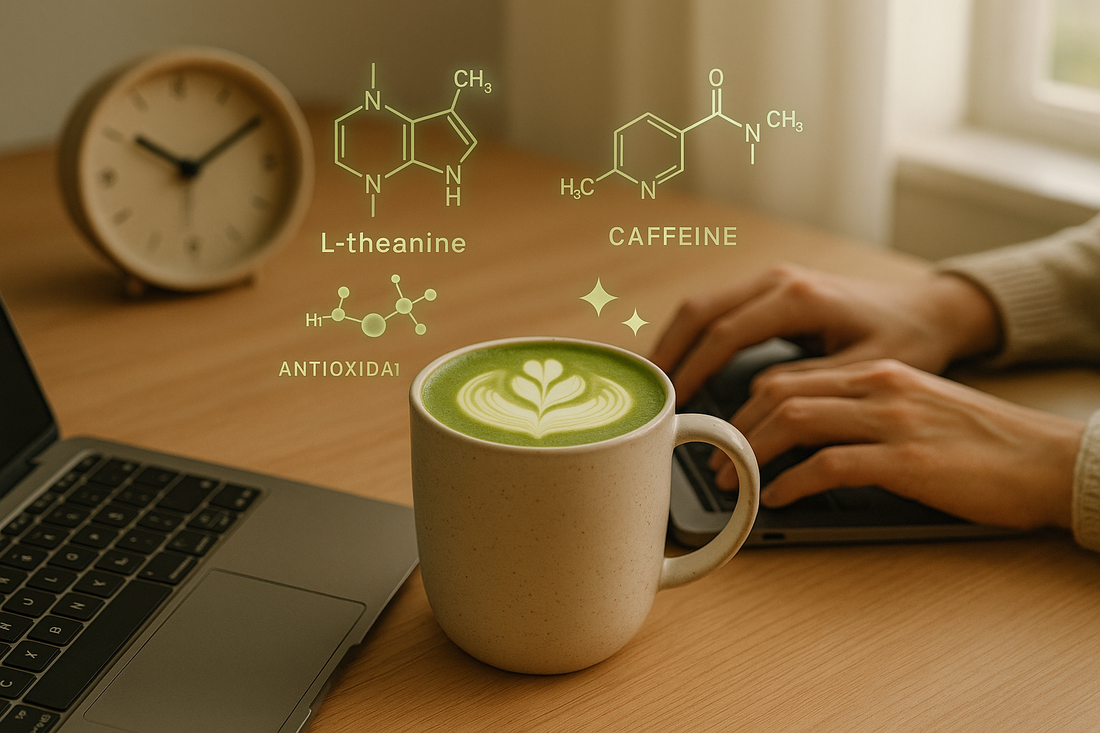
For many people, the afternoon slump is synonymous with multiple cups of coffee and a crashing energy roller‑coaster. Coffee provides a quick jolt of caffeine, but it often leads to jitters, a rapid heart rate and a subsequent crash, especially when consumed in excess. Ready‑to‑drink matcha oat lattes offer a smoother alternative supported by science.
How matcha supports cognitive performance
Research has shown that matcha enhances attention, reaction time and memory[1]. These effects are partly due to the presence of L‑theanine, an amino acid that promotes a calm but alert mental state[1]. In a study where participants took 100 mg of L‑theanine, they reacted faster and made fewer errors on attention tasks[1]. A systematic review found that the combination of caffeine and L‑theanine significantly improved simple reaction times, working memory and task accuracy, while reducing headaches and fatigue[1]. Participants consuming matcha beverages performed better on attention‑demanding tasks and completed more work compared with those drinking caffeine alone[1].
Matcha also contains antioxidants and catechins that may protect brain cells from oxidative stress[2], supporting long‑term cognitive health. Compared with coffee, which can lead to energy spikes and crashes, matcha’s caffeine is absorbed more slowly due to the presence of L‑theanine and dietary fibres[2]. This leads to steady, sustained energy[2].
Why coffee falls short
Coffee has its benefits, but large doses of caffeine can cause increased heart rate and anxiety, and the energy spike is often followed by a sharp decline. Drinking multiple cups in the afternoon can also disrupt sleep patterns, leaving you more tired the next day.
Strategies to overcome the slump with matcha
-
Swap your afternoon coffee for matcha: Replace your second or third coffee with a matcha oat latte. The caffeine–L‑theanine combination provides a lift without the crash[1].
-
Take movement breaks: Prolonged sitting contributes to fatigue. Studies show that walking for five minutes every 30 minutes reduces blood sugar spikes and lowers blood pressure[3]. Similarly, short bursts of exercise throughout the day boost mood, productivity and brain function[3]. Enjoy your latte after a quick walk or desk stretch to reset your energy.
-
Hydrate and eat smart: Dehydration and low blood sugar can exacerbate fatigue. Alongside your matcha, drink water and choose a snack rich in protein and healthy fats (nuts, yoghurt, fruit). Matcha supports metabolism and fat burning[4].
-
Incorporate mindful pauses: Use the ritual of preparing or opening a matcha oat latte as a cue to check in with yourself. A short journaling session can clear mental clutter and reduce stress[5]. Accepting your emotions and thoughts is associated with better psychological health[5].
Building an afternoon ritual
Consistency matters. Schedule your matcha break at the same time each day to regulate energy levels and avoid impulsive coffee runs. Set a reminder to stand up, stretch or walk, then savour your latte mindfully. Over time, you may find that you accomplish more in the afternoon, feel calmer and sleep better at night.
Take the challenge: Try replacing your afternoon coffee with a matcha oat latte for one week. Keep track of your productivity, mood and sleep quality. Share your experiences on social media with #HouseOfMatchaFocus to inspire others. With its science‑supported blend of caffeine, L‑theanine and antioxidants, matcha may be the secret weapon your workday needs.
References
[1] Matcha consumption improves attention, reaction time and memory; L‑theanine produces a calm but alert state, improves reaction time and accuracy when combined with caffeine, and reduces headaches and fatigue; participants consuming matcha completed more work and showed better attention than those consuming caffeine alonehealthline.comverywellhealth.comverywellhealth.comcureus.comcureus.com.
[2] Matcha contains antioxidants and catechins that may protect brain cells from oxidative stress and its caffeine is absorbed more slowly due to L‑theanine and dietary fibre, leading to steadier energyhealthline.compmc.ncbi.nlm.nih.gov.
[3] Walking for five minutes every 30 minutes lowers blood sugar spikes and blood pressure, and short bouts of exercise boost mood, productivity and cognitive functionhealth.harvard.eduhingehealth.com.
[4] Matcha supports metabolism and fat oxidation, providing energy without spiking insulin.
[5] Journaling reduces anxiety and stress, improves emotional regulation and self‑esteem, and accepting one’s thoughts and feelings is linked to better psychological healthpositivepsychology.compositivepsychology.com.